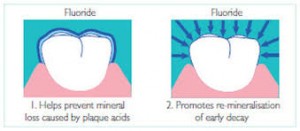Fluoride is a mineral that occurs naturally in many foods and water. Every day, minerals are added to and lost from a tooth’s enamel layer through two processes, demineralization and remineralization. Minerals are lost (demineralization) from a tooth’s enamel layer when acids — formed from plaque bacteria and sugars in the mouth — attack the enamel. Minerals such as fluoride, calcium, and phosphate are redeposited (remineralization) to the enamel layer from the foods and waters consumed. Too much demineralization without enough remineralization to repair the enamel layer leads to tooth decay.  Fluoride helps prevent tooth decay by making the tooth more resistant to acid attacks from plaque bacteria and sugars in the mouth. It also reverses early decay. In children under 6 years of age, fluoride becomes incorporated into the development of permanent teeth, making it difficult for acids to demineralize the teeth. Fluoride also helps speed remineralization as well as disrupts acid production in already erupted teeth of both children and adults.
Fluoride helps prevent tooth decay by making the tooth more resistant to acid attacks from plaque bacteria and sugars in the mouth. It also reverses early decay. In children under 6 years of age, fluoride becomes incorporated into the development of permanent teeth, making it difficult for acids to demineralize the teeth. Fluoride also helps speed remineralization as well as disrupts acid production in already erupted teeth of both children and adults.

- Home
- About Us
- Services
- Dental Lifestyle
- Wedding Smiles
- Gallery
- Contact Us
+91 1724648877
+91 9015455577
Clinic Timings
Mon - Sat - 9.30 AM to 2.00 PM
4.00 PM to 7.00 PM
Sunday By Prior Appointment
+91 9015455577
Clinic Timings
Mon - Sat - 9.30 AM to 2.00 PM
4.00 PM to 7.00 PM
Sunday By Prior Appointment


